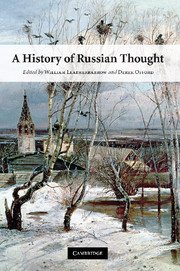Book contents
- Frontmatter
- Contents
- Preface
- List of contributors
- Dates, transliteration and other conventions
- Dates of reigns
- Russian titles of journals, newspapers and miscellanies
- PART I CONTEXT
- 1 Introduction
- 2 The political and social order
- 3 Russian intelligentsias
- PART II INTELLECTUAL CURRENTS
- PART III THEMES AND CONSTRUCTS
- PART IV THE AFTERLIFE OF CLASSICAL THOUGHT
- Biographical details of thinkers and writers
- Selected bibliography
- Index
1 - Introduction
Published online by Cambridge University Press: 05 June 2012
- Frontmatter
- Contents
- Preface
- List of contributors
- Dates, transliteration and other conventions
- Dates of reigns
- Russian titles of journals, newspapers and miscellanies
- PART I CONTEXT
- 1 Introduction
- 2 The political and social order
- 3 Russian intelligentsias
- PART II INTELLECTUAL CURRENTS
- PART III THEMES AND CONSTRUCTS
- PART IV THE AFTERLIFE OF CLASSICAL THOUGHT
- Biographical details of thinkers and writers
- Selected bibliography
- Index
Summary
In chapter 2 of this volume David Saunders comments on how in the 1950s and 1960s ‘Russian thought used to be fashionable’, occupying centre stage in English-language historical writing. This association of ‘Russian thought’ with historical scholarship implicitly raises the question of what precisely is the subject we are attempting to address in this volume. Not all scholars would necessarily embrace the view that it is primarily a mode of Russian historical study, although all surely would acknowledge the close association between ‘history’ and ‘thought’. The approaches (and even the titles) of some of the major English-language works on the subject betray this uncertainty. While the works of Nicholas Riasanovsky, Martin Malia, Marc Raeff and Richard Pipes, for example, consistently seek to locate Russian thought primarily within the context of social and political history, the three-volume anthology edited in the 1960s by James M. Edie, James P. Scanlan, Mary-Barbara Zeldin and George L. Kline suggests a much broader understanding in its title Russian Philosophy. It sets out to be the first historical anthology of ‘Russian philosophical thought’, and alongside examples of socio-political thought it includes metaphysical philosophy by thinkers such as Berdiaev, Shestov, Frank and Lossky, as well as the work of ecclesiastical and religious thinkers like the ‘Russian Socrates’ Skovoroda and the pre-revolutionary ‘theologians’ Fedorov and Solovev – figures who do not always find their way into other treatments of Russian thought.
- Type
- Chapter
- Information
- A History of Russian Thought , pp. 3 - 16Publisher: Cambridge University PressPrint publication year: 2010



